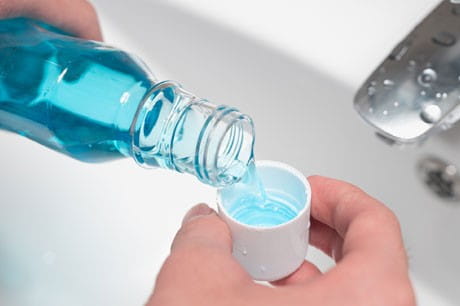Is mouthwash bad for you?
Weigh the pros and cons before adding mouthwash to your dental care routine.
You just woke up from a long night’s sleep. Or ate a meal chock full of garlic. There's nothing like that fresh feeling after swishing some mouthwash, right? But does “fresh” mean “healthy”?
“The concept behind most popular mouthwashes is to kill bacteria in your mouth,” says Natalie Stinton, DMD, a pediatric dentist at Geisinger. “These bacteria can lead to tooth decay, gum disease and halitosis, more commonly known as bad breath.”
But if it works a little too well at killing off bacteria, could mouthwash actually be bad for you? Before you swish and spit, consider these facts.
What’s in your mouthwash?
Your pharmacy’s shelves are probably stocked with rinses targeting all kinds of dental concerns, from breath freshening to teeth whitening. The ingredients of each can vary depending on its intended use.
Some common over-the-counter mouthwash ingredients are:
- Alcohol
- Fluoride
- Peroxide
- Essential oils
- Flavoring and dyes
Prescription mouthwashes contain stronger ingredients (like chlorhexidine) and may be used to target specific conditions like:
- Gingivitis
- Dry mouth
- Dry socket after having a tooth pulled
- Mouth sores from chemotherapy or radiation
Benefits of mouthwash
Depending on the ingredients and your goals, mouthwash can be part of a good oral hygiene routine. Some potential benefits include:
Strengthening enamel
“Mouthwashes containing fluoride can help strengthen your enamel and protect against tooth decay,” says Dr. Stinton.
But if you’re using both a fluoride toothpaste and mouthwash, it’s best to rinse first then brush.
“Over-the-counter mouthwashes have less fluoride than toothpaste, so rinsing after brushing could wash away the stronger cavity protection benefits,” says Dr. Stinton.
Reaching all corners of your mouth
Mouthwash can reach areas that might be hard to get with your toothbrush or floss alone.
“Rinses should never replace brushing and flossing,” says Dr. Stinton. “But they can help kill harmful bacteria you might have missed.”
Eliminating bad breath
If your bad breath is caused by bacteria, antibacterial mouthwash could help freshen things up. But pay attention to the ingredients to make sure you’re addressing the underlying problem.
“Some over-the-counter mouthwashes rely on flavorings to temporarily mask bad breath. To treat halitosis, you need a rinse that targets the bacteria causing it,” explains Dr. Stinton.
Drawbacks of mouthwash
Still, there are some factors to consider before adding a rinse to your routine:
Killing bacteria a little too well
You might’ve heard about the “good” bacteria in your gut, but your mouth is also home to a thriving community of microorganisms.
Known collectively as your “oral microbiome,” the bacteria in your mouth play an important role in keeping you healthy. Some help break down nutrients and regulate blood pressure while others protect against inflammation.
“The problem is that while there are bad and smelly bacteria we want to get rid of, there are also good bacteria that we need, and antibacterial mouthwash doesn’t differentiate,” says Dr. Stinton. “More research is needed, but overusing mouthwash could throw off your mouth’s microbiome.”
Irritation, burning and dryness
While some people enjoy feeling the burn after swigging mouthwash, it’s not always a good thing.
“Alcohol-based mouthwashes tend to cause a burning or tingling sensation that can be too intense for some people,” says Dr. Stinton. “This can irritate mouth sores, make tooth and gum sensitivity worse or lead to dryness.”
If you’re not a fan of this burning feeling, reach for an alcohol-free formula.
May increase risk of oral cancer
Irritation isn’t the only reason you may want to switch to alcohol-free mouthwash.
“Some studies suggest that long-term alcohol exposure can increase your risk of oral cancer,” says Dr. Stinton. “More research is needed to determine if there’s a true cause and effect, but it’s worth sticking with an alcohol-free formula if you’re a frequent mouthwash user.”
Staining teeth
It sounds counterintuitive, but some mouthwashes can cause tooth stains rather than prevent them.
“Studies have shown that rinses with the ingredients cetylpyridinium chloride or chlorhexidine, commonly prescribed to treat bad breath or gingivitis, could cause brown staining on teeth,” says Dr. Stinton.
If you’ve been prescribed one of these mouthwashes and are concerned about stains, talk with your dentist or pharmacist about ways to reduce this side effect.
So, is mouthwash necessary?
“There’s no hard evidence to say whether or not mouthwash is bad for you,” says Dr. Stinton. “Your dentist can help you weigh the pros and cons and determine if it’s right for you."
Ultimately, deciding whether or not to use mouthwash mostly comes down to personal preference. Your dentist or primary care provider can help evaluate your needs and recommend the right product for you.
Ready to rinse? Here’s how to use mouthwash:
- Use your mouthwash before brushing to avoid washing away your toothpaste’s fluoride benefits.
- Pour the recommended amount into a cup.
- Swish and gargle for around 30 seconds, being careful not to swallow any. Note: Unless directed by your dentist or pediatrician, children under 6 should not use mouthwash due to the risk of swallowing it.
- Spit the mouthwash out.
- Follow your rinse by brushing for at least two minutes with fluoride toothpaste. Wait at least 30 minutes before eating, drinking or rinsing.
All that’s left to do is smile and enjoy that fresh feeling.
Next steps:
Learn more about dental care at Geisinger
What’s behind your bad breath?
Could not brushing your teeth make you sick?





